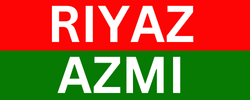Riyaz Azmi’s Healthcare Revolution: Free Medical Camps and Mobile Clinics in Bhiwandi
In a world where healthcare is increasingly becoming a commodity, access to medical services remains a major concern, especially for the marginalized and underprivileged sections of society. Bhiwandi, Maharashtra, like many other regions in India, has faced its share of healthcare challenges—limited facilities, lack of access to specialists, and the high cost of treatment. However, one individual is working tirelessly to change this narrative: Riyaz Azmi, a dedicated leader and social activist. Through his initiative of organizing free medical camps and launching mobile clinics, Azmi has revolutionized healthcare access in Bhiwandi, ensuring that thousands of residents receive the medical attention they deserve, regardless of their financial situation.
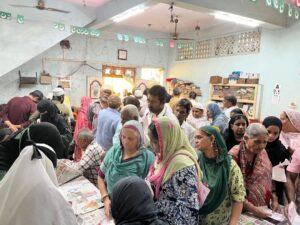
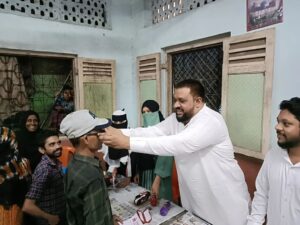
Introduction to Riyaz Azmi’s Healthcare Vision
Riyaz Azmi is well-known for his commitment to public welfare and community development in Bhiwandi. While his work spans multiple sectors, his healthcare initiatives have been particularly impactful. Azmi’s healthcare mission is grounded in the belief that access to medical services is a fundamental right, not a privilege. His approach is simple but effective—bring healthcare to the people. By organizing free medical camps and setting up mobile clinics that travel to underserved areas, Azmi is making healthcare both accessible and affordable for those who need it most.
The Healthcare Crisis in Bhiwandi
Before diving into the specifics of Azmi’s healthcare initiatives, it is important to understand the challenges that Bhiwandi residents face when it comes to medical care. Like many parts of India, Bhiwandi’s healthcare system is plagued by a range of issues:
- Limited Healthcare Facilities: Many neighborhoods lack clinics or hospitals, forcing residents to travel long distances to receive basic medical care.
- High Costs: Even where medical services are available, the costs associated with treatments, diagnostics, and medications are often prohibitive for low-income families.
- Lack of Preventive Healthcare: The focus in many areas remains on treating illnesses rather than preventing them, leading to more severe health issues that could have been avoided with early intervention.
- Shortage of Specialists: Specialized medical care—such as ophthalmology, dental care, and even general physicians—is often hard to come by in rural or underserved areas.
These challenges mean that many people simply don’t receive the healthcare they need, with dire consequences for their overall well-being.
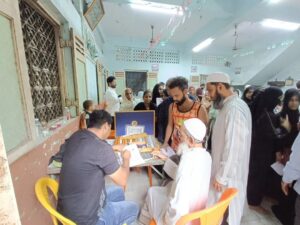
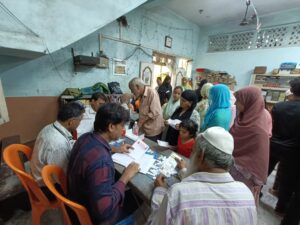
Riyaz Azmi’s Free Medical Camps: A Lifeline for the Underprivileged
Riyaz Azmi’s free medical camps have become a lifeline for thousands of Bhiwandi residents. These camps, held regularly in various parts of the city, offer a wide range of medical services free of charge, targeting both immediate medical needs and preventive healthcare.
What Happens at These Free Medical Camps?
The free medical camps organized by Riyaz Azmi provide several key services:
- General Health Screenings: Doctors conduct comprehensive health screenings, checking for common conditions such as high blood pressure, diabetes, respiratory issues, and malnutrition. These screenings help in early detection of potential health issues, allowing for timely treatment.
- Eye Check-ups and Cataract Screenings: Many elderly residents suffer from vision problems, yet they cannot afford regular check-ups. The camps offer free eye screenings, cataract diagnosis, and even provide free spectacles where necessary.
- Dental Check-ups: Dental care is often neglected, especially in low-income communities. The camps provide free dental examinations, focusing on oral hygiene education and treating conditions like cavities and gum disease.
- Free Medicines and Prescriptions: One of the major benefits of these camps is that they distribute free medications. Residents receive necessary prescriptions and medications for a range of conditions, reducing the financial burden of treatment.
- Specialist Consultations: In addition to general physicians, Azmi’s camps often bring in specialists like pediatricians, gynecologists, and ENT (Ear, Nose, Throat) doctors, offering services that residents may not have access to otherwise.
These camps are held in easily accessible locations, allowing hundreds of people to attend each session. Importantly, they cater to individuals from all walks of life, including women, children, the elderly, and disabled individuals—populations that often face the greatest barriers to healthcare access.
The Focus on Preventive Healthcare
One of the most innovative aspects of Riyaz Azmi’s healthcare camps is the emphasis on preventive healthcare. Rather than only addressing medical emergencies or treating symptoms, the camps focus on educating the community about the importance of regular check-ups, vaccinations, proper nutrition, and lifestyle changes that can help prevent chronic illnesses. This preventive approach is crucial in a setting where many health issues, like diabetes or hypertension, remain undiagnosed until they lead to more severe complications.
Through workshops, counseling sessions, and health education talks, Azmi’s team ensures that every person who attends a camp leaves with a better understanding of how to take care of their health. This emphasis on prevention is helping to create a healthier, more informed community over time.
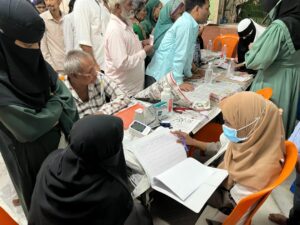
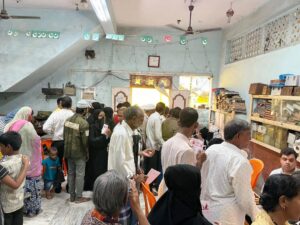
Mobile Clinics: Healthcare on Wheels
While the free medical camps have provided much-needed relief to thousands, Riyaz Azmi recognized that there were still many people who could not attend these camps due to geographical barriers. To address this gap, he launched mobile clinics—a service that literally brings healthcare to people’s doorsteps.
How Mobile Clinics Work
The mobile clinics are equipped with basic medical equipment, medications, and healthcare staff. They travel to different neighborhoods, particularly those that are far from medical facilities or where people struggle with mobility issues. These clinics offer services similar to those provided at the medical camps, including:
- Health Screenings: Regular check-ups and screenings for common ailments.
- Free Medications: Distribution of necessary medicines for chronic conditions like hypertension, asthma, and diabetes.
- Vaccination Drives: Administering vaccines to prevent diseases like polio, measles, and tuberculosis, especially among children.
- Follow-Up Care: The mobile clinics also provide follow-up care for individuals who have previously visited the medical camps, ensuring continuity of care.
The Impact of Mobile Clinics
The introduction of mobile clinics has been a game-changer for the residents of Bhiwandi, particularly for those living in remote or underserved areas. People who previously had to travel long distances to reach a clinic or hospital can now receive quality healthcare at their doorsteps. For the elderly and disabled, this has been especially beneficial, as the clinics eliminate the need for transportation to distant facilities.
The mobile clinics operate on a rotational basis, ensuring that they cover a wide geographical area and serve as many people as possible. This mobile healthcare solution is particularly vital in addressing health crises quickly and effectively, especially in areas prone to diseases due to poor sanitation and lack of clean water.
Addressing Healthcare Inequality
Riyaz Azmi’s healthcare initiatives are not just about providing services—they are about addressing the healthcare inequality that exists in Bhiwandi. In India, as in many parts of the world, healthcare is often inaccessible to those who need it most—low-income families, rural populations, and marginalized communities. By offering free medical camps and mobile clinics, Azmi is directly challenging this inequality, making healthcare available to everyone, regardless of their socio-economic status.
His efforts are helping to close the gap between those who can afford healthcare and those who cannot. Moreover, by focusing on preventive healthcare, Azmi is tackling the root causes of poor health in these communities, not just treating the symptoms.
Impact on the Community
The impact of Riyaz Azmi’s healthcare initiatives has been nothing short of remarkable. Over the past few years, thousands of individuals in Bhiwandi have received free medical care, many of whom had never visited a doctor or undergone a health check-up before. The result has been a healthier, more informed, and empowered community.
Improved Health Outcomes
With regular health screenings and access to medications, there has been a noticeable improvement in health outcomes, especially among the elderly and those suffering from chronic illnesses. Early detection of diseases like diabetes, hypertension, and eye disorders has allowed for timely intervention, preventing complications and improving the quality of life for many.
Increased Awareness of Health Issues
Azmi’s healthcare initiatives have also raised awareness about important health issues in the community. People are now more knowledgeable about the importance of preventive healthcare, and there is a growing culture of regular health check-ups. This increased awareness has led to better health practices at the household level, from improved sanitation to better dietary habits.
Empowering Women and Children
Women and children, in particular, have benefitted from Azmi’s healthcare services. Many women in low-income households often neglect their own health due to financial constraints, prioritizing the needs of their families instead. Azmi’s camps have provided them with a safe space to seek medical care without the burden of cost. Additionally, vaccination drives and child health services have improved the health outcomes for children, reducing the prevalence of preventable diseases.
A Holistic Approach to Community Well-being
Riyaz Azmi’s healthcare revolution is part of a larger vision of community well-being. He understands that health is not just about treating illnesses—it’s about creating an environment where people can thrive. This is why his healthcare initiatives are closely linked to his other social welfare programs, such as youth empowerment, women’s rights, and environmental sustainability. Together, these efforts are building a healthier, more resilient community in Bhiwandi.
